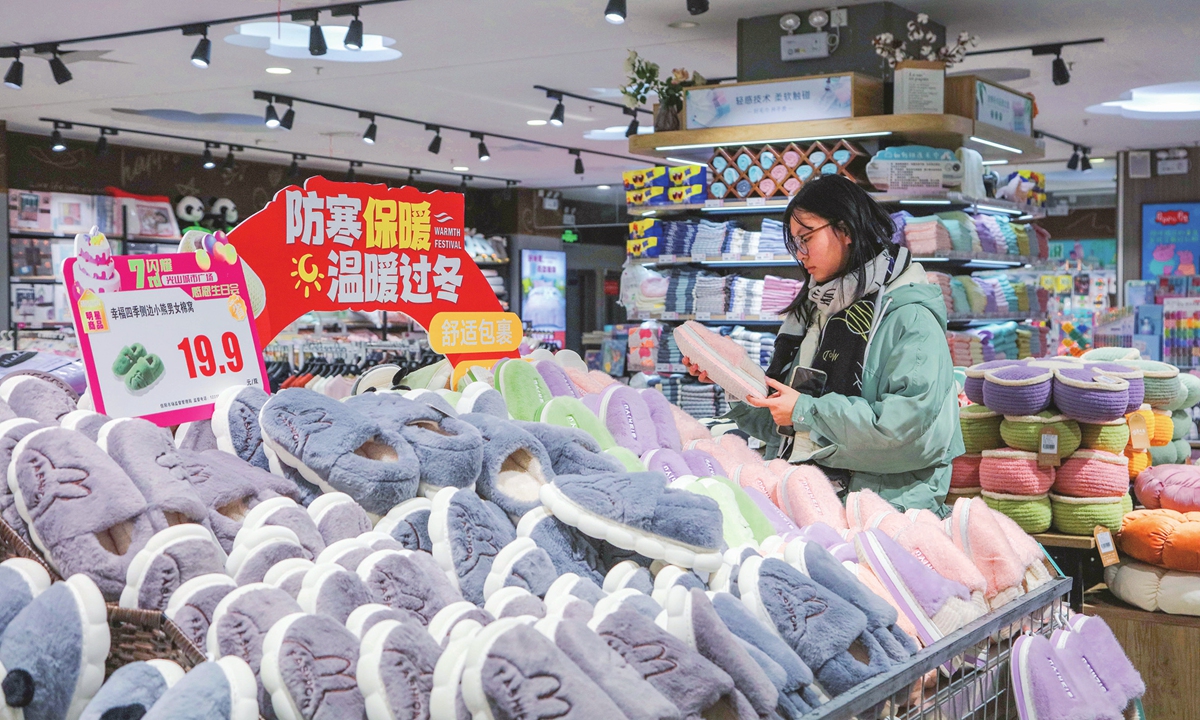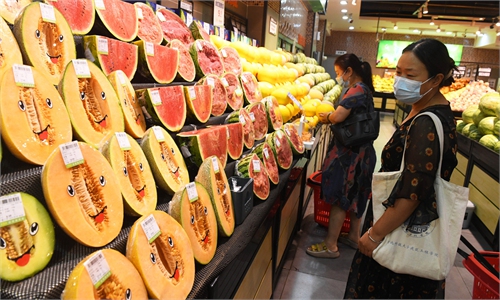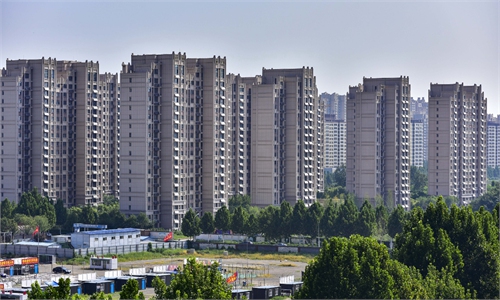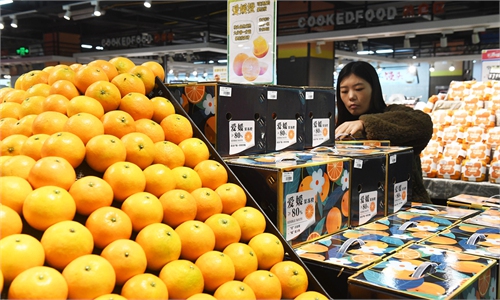Deflation risks to ease, China's economic outlook optimistic as more support policies land, consumption recovers further

A customer checks out winter slippers at a supermarket in Guangshan county, Central China's Henan Province on November 26, 2023. Since early November, a large swath of the country has experienced cold spells, gusting winds, and plunging temperatures, as well as ice and snow, prompting people to buy down clothes, electric heaters and other necessities. Photo: VCG
China's consumer prices and factory prices fell in November, mainly due to lower commodity prices. However, despite foreign media hype that saw the readings as fresh proof of the Chinese economy facing trouble, Chinese economists said the outlook remains optimistic as more support policies materialize, prompting a further consumption recovery.
The consumer price index (CPI), a main gauge of inflation, fell 0.5 percent in November, both year-on-year and month-on-month, mainly due to a decrease in energy prices, data from the National Bureau of Statistics (NBS) showed on Saturday.
The core CPI, which excludes food and energy prices, increased by 0.6 percent year-on-year and maintained a moderate increase.
The producer price index (PPI), which measures costs for goods at the factory gate, fell 3 percent year-on-year in November, affected by a decline in international oil prices and weak demand in the industrial product markets, according to the NBS.
The CPI reading was a multi-month low and some foreign media outlets took the reading as proof of deflation and claimed that China's economic recovery is facing difficulty.
Chinese experts said the weak CPI reading was due to a range of factors including weak prices of energy and pork and the persistent risk of external deflationary pressure, and can in no way be seen as proof of deflation or the Chinese economy getting into trouble.
They noted that the data, as shown by the moderate increase in the core CPI, don't prove that deflation has taken hold but only indicate the economy is experiencing a period of low inflation, and deflation risks will ease as hog prices enter a rising track.
Along with measures already announced and more on the way, as the top leadership called for efforts to increase domestic demand and form a virtuous circle in which consumption and investment promote each other in 2024, the Chinese consumption sector will further recover and serve as a spearhead of China's post-pandemic economic recovery process, they noted.
Cao Heping, an economist at Peking University, told the Global Times on Sunday that lower CPI readings may not necessarily translate into consumers postponing purchasing decisions and actually have a quickening effect encouraging people to spend.
"Moderate consumer price data is sought after by countries around the world, and the government only needs to make sure the reading is not so low that it affects producers, which can lead to cuts in production and investment," Cao said.
Despite the weak CPI data, China's major industrial firms' combined profits increased for a third straight month in October, official data showed on November 27.
The profits of major industrial firms with annual main business revenue of at least 20 million yuan ($2.8 million) went up 2.7 percent year-on-year, according to the NBS.
Li Changan, a professor at the Academy of China Open Economy Studies of the University of International Business and Economics, told the Global Times on Sunday that unlike developed economies where GDP growth is primarily driven by consumption, the Chinese economy is still in large part driven by investment.
"That means the Chinese economy may see wider sways in some economic data than those of Western countries, and the impact of changes in CPI readings should not be exaggerated. Western experience can serve as a reference, not as criteria," Li said.
The vast size of the Chinese consumption market means even moderate growth is substantial, Li said, noting that in general the Chinese consumption recovery is still on track and will propel the broader economic recovery.
Retail sales in October expanded 7.6 percent year-on-year to 4.33 trillion yuan, showcasing accelerated consumption. In the first 10 months, retail sales topped 38.54 trillion yuan, up 6.9 percent.
In the first three quarters of 2023, consumption contributed 83.2 percent of the economic expansion, accounting for 4.4 percentage points of the GDP growth rate, official data showed.
Chinese officials have on more than one occasion pointed out that China is unlikely to face deflation risks.
On November 28, Pan Gongsheng, governor of the People's Bank of China, the country's central bank, said at a conference in Hong Kong that China's CPI is gradually bottoming out. "We don't think the fall in food prices will be sustained and we expect the CPI to go up afterward."
On November 15, NBS spokesperson Liu Aihua said consumer prices operating within a low range will gradually ease in the coming months.
Since the beginning of the fourth quarter, China's consumption has demonstrated great vitality, with the 6th China International Import Expo recording annual growth of 6.74 percent in the value of tentative deals signed and the "Double 11" shopping spree seeing "record figures."
However, analysts noted that more support policies will be needed to unleash the full consumption power of the Chinese market. Support policies rolled out earlier need to be firmly implemented and more should be considered.
Cao said in the next phase, more supportive monetary policy is needed to keep the CPI reading from getting too low.
In recent weeks, China has introduced more policies to support a real estate sector undergoing adjustments and promote a further economic recovery next year.




